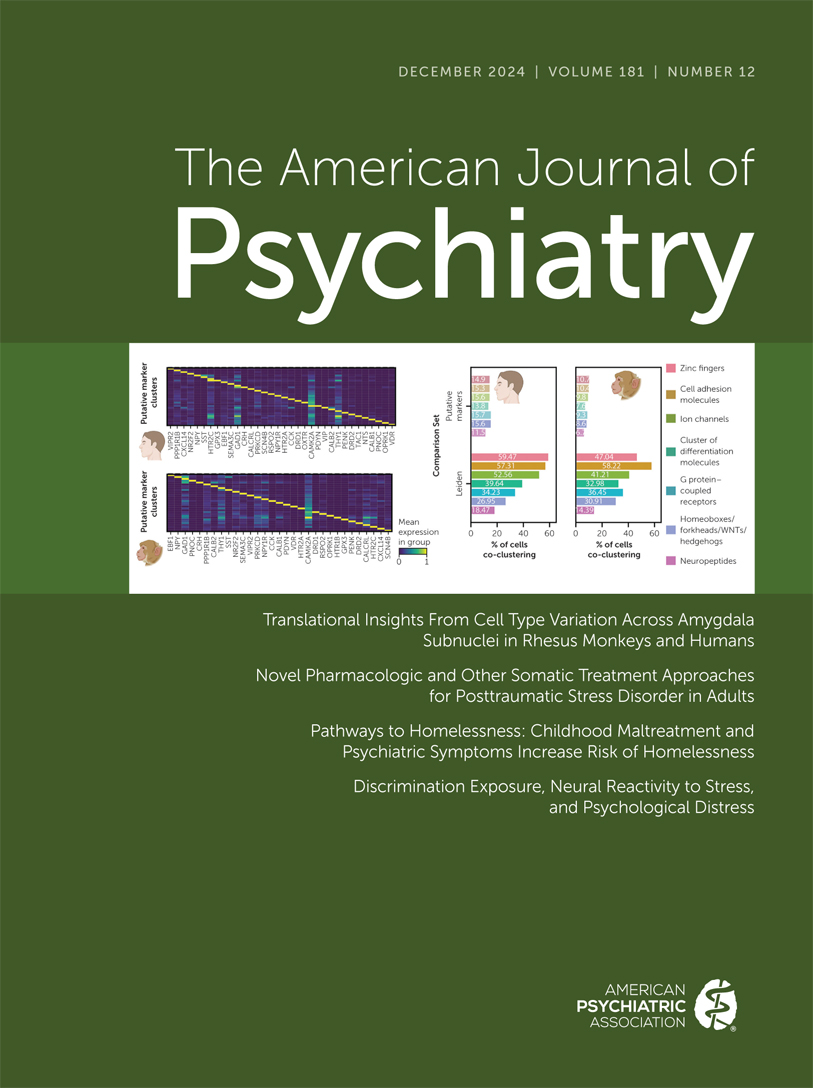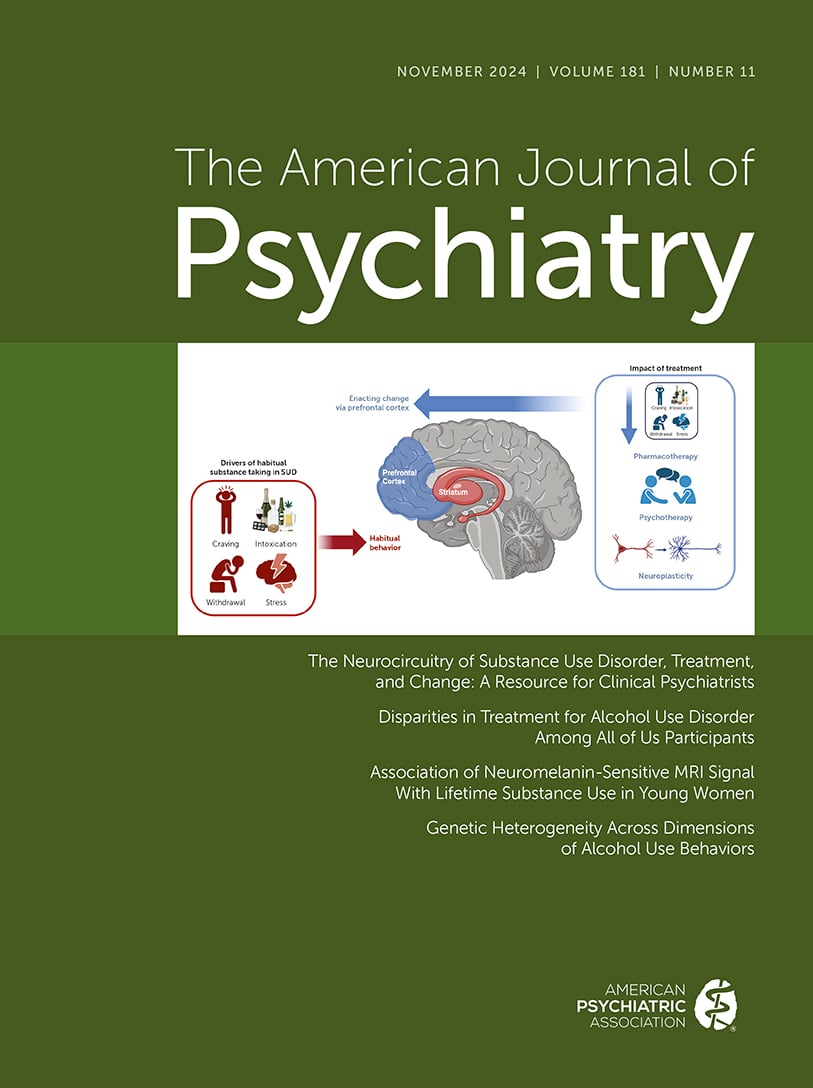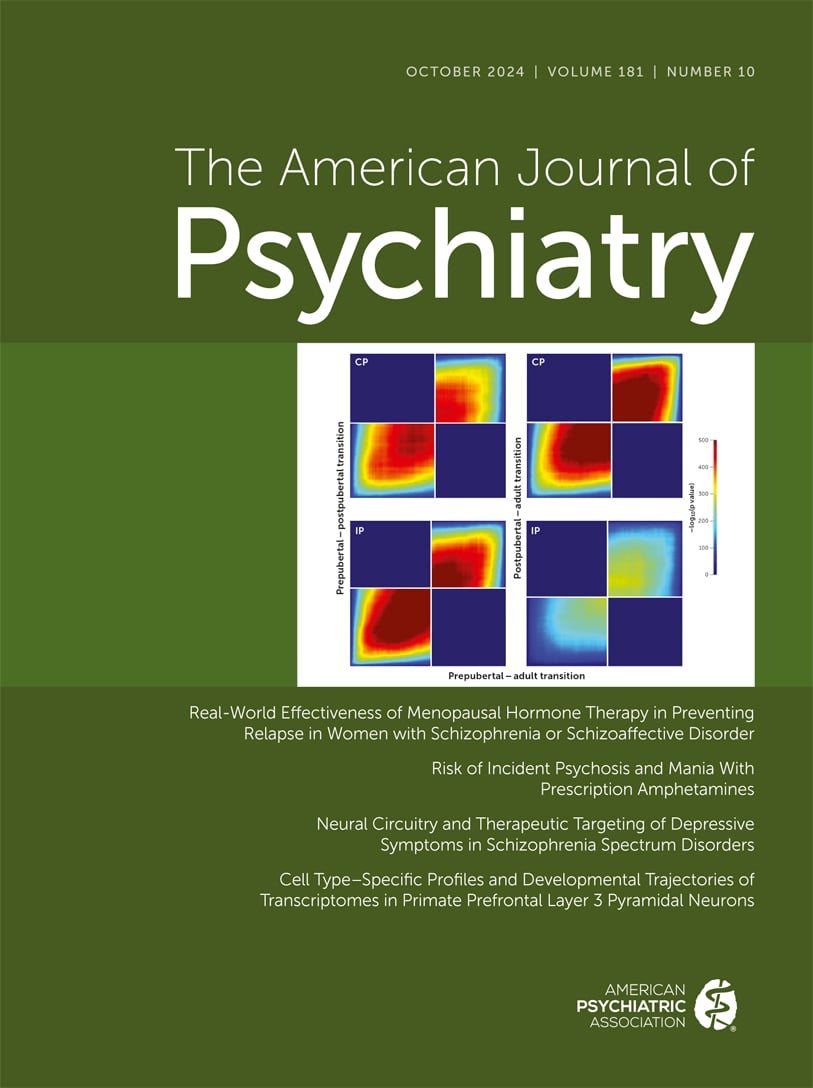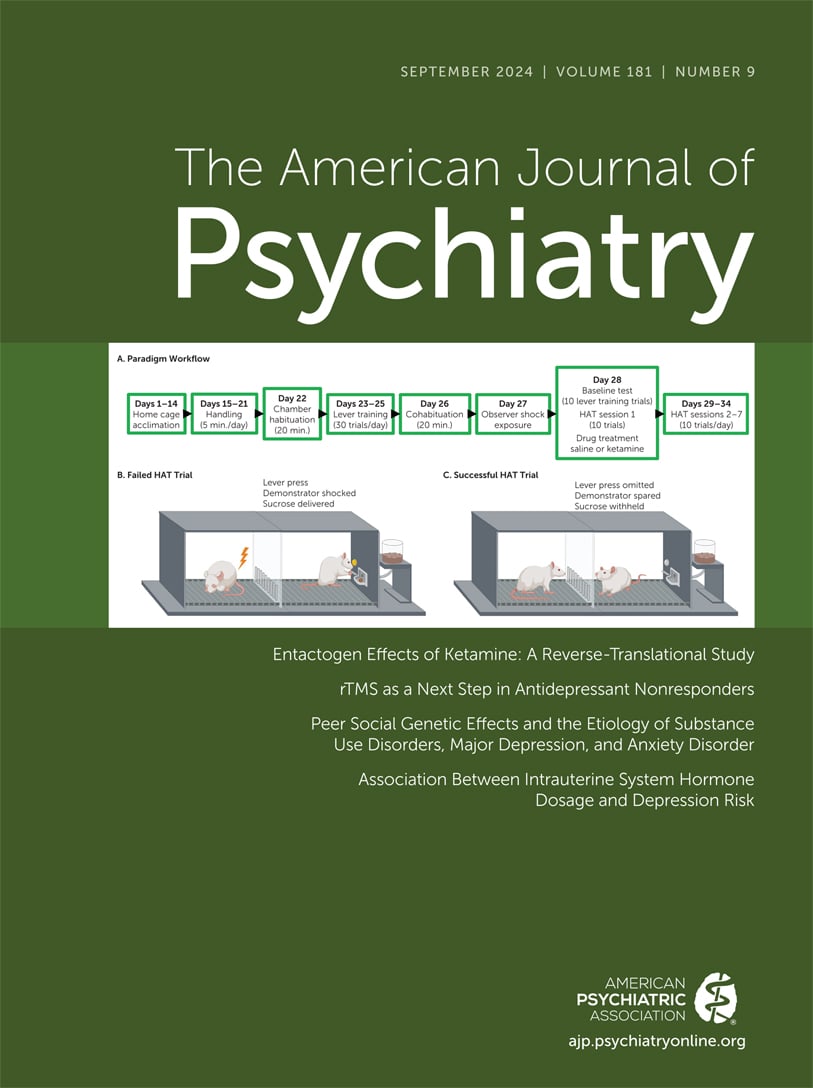American Journal of Psychiatry
- Volume 160
- Number 2
- February 2003
Editorial
Reviews and Overviews
Publication date: 01 February 2003
Pages208–220There has been tremendous progress in developing techniques for manipulating genetic material, and the birth of gene therapy as a discipline has been one consequence of this. Most considerations of gene therapy in the nervous system have focused on ...
https://doi.org/10.1176/appi.ajp.160.2.208Publication date: 01 February 2003
Pages221–236OBJECTIVE: Chronic fatigue syndrome is an illness characterized by disabling fatigue of at least 6 months, accompanied by several other symptoms. This review summarizes the current state of knowledge about chronic fatigue syndrome. METHOD: The case ...
https://doi.org/10.1176/appi.ajp.160.2.221Images in Neuroscience
Introspections
Images in Psychiatry
Article
Publication date: 01 February 2003
Pages242–247OBJECTIVE: The authors retrospectively examined a spectrum of childhood traits that reflect obsessive-compulsive personality in adult women with eating disorders and assessed the predictive value of the traits for the development of eating disorders. ...
https://doi.org/10.1176/appi.ajp.160.2.242Publication date: 01 February 2003
Pages248–254OBJECTIVE: This study examined the importance of potential risk factors for eating disorder onset in a large multiethnic sample followed for up to 3 years, with assessment instruments validated for the target population and a structured clinical interview ...
https://doi.org/10.1176/ajp.160.2.248Publication date: 01 February 2003
Pages255–261OBJECTIVE: Binge eating disorder is associated with obesity. Topiramate is an antiepileptic agent associated with weight loss. The objective of this study was to evaluate topiramate in the treatment of binge eating disorder associated with obesity. METHOD:...
https://doi.org/10.1176/appi.ajp.160.2.255Publication date: 01 February 2003
Pages262–273OBJECTIVE: Recent years have seen a revolution in views regarding cerebellar function. New findings suggest that the cerebellum plays a role in multiple functional domains: cognitive, affective, and sensory as well as motor. These findings imply that ...
https://doi.org/10.1176/appi.ajp.160.2.262Publication date: 01 February 2003
Pages274–283OBJECTIVE: The syndromal and subsyndromal phenomenology of borderline personality disorder was tracked over 6 years of prospective follow-up. METHOD: The psychopathology of 362 inpatients with personality disorders was assessed with the Revised Diagnostic ...
https://doi.org/10.1176/appi.ajp.160.2.274Publication date: 01 February 2003
Pages284–289OBJECTIVE: This study examined the prevalence of impaired fasting glucose tolerance in first-episode, drug-naive patients with schizophrenia. METHOD: In this cross-sectional study, fasting plasma levels of glucose, insulin, lipids, and cortisol were ...
https://doi.org/10.1176/appi.ajp.160.2.284Publication date: 01 February 2003
Pages290–296OBJECTIVE: The association of hyperglycemia and hypercholesterolemia with use of atypical antipsychotics has been documented in case reports and uncontrolled studies. The authors’ goal was to assess the effects of clozapine, olanzapine, risperidone, and ...
https://doi.org/10.1176/appi.ajp.160.2.290Publication date: 01 February 2003
Pages297–302OBJECTIVE: Since increased norepinephrine availability may account for the weight-reducing effect of appetite suppressants, the authors hypothesized that the addition of the selective norepinephrine reuptake inhibitor reboxetine may prevent or attenuate ...
https://doi.org/10.1176/appi.ajp.160.2.297Publication date: 01 February 2003
Pages303–309OBJECTIVE: The authors tested the hypothesis that a dopamine D2 receptor occupancy level between 60% and 70% in patients with recent-onset schizophrenia would result in optimal subjective experience. In addition, they sought preliminary evidence on ...
https://doi.org/10.1176/appi.ajp.160.2.303Publication date: 01 February 2003
Pages310–315OBJECTIVE: Outcomes monitoring data in a large health care system were used to evaluate the effectiveness of atypical neuroleptic medications in actual clinical practice. METHOD: National administrative data from the Department of Veterans Affairs were ...
https://doi.org/10.1176/appi.ajp.160.2.310Publication date: 01 February 2003
Pages316–322OBJECTIVE: The study goal was to determine whether schizophrenic and depressed smokers perceive the reinforcement value of cigarette smoking differently from nonpsychiatric smokers who smoke as heavily. METHOD: The authors assessed the preferences for ...
https://doi.org/10.1176/appi.ajp.160.2.316Publication date: 01 February 2003
Pages323–333OBJECTIVE: The effects of acute nicotine administration and smoking on brain function were investigated in two studies, with the primary goal of identifying neural systems that mediate these effects. METHOD: In study 1, 18 healthy volunteer cigarette ...
https://doi.org/10.1176/appi.ajp.160.2.323Publication date: 01 February 2003
Pages334–340OBJECTIVE: Recent studies have indicated that the serotonergic (5-HT) system plays important roles in memory function. However, the specific relationship between 5-HT1A receptors and memory function is not clear in the human brain. To clarify this ...
https://doi.org/10.1176/appi.ajp.160.2.334Publication date: 01 February 2003
Pages341–349OBJECTIVE: Delusional thoughts are common in patients with Alzheimer’s disease and contribute prominently to morbidity. The pathophysiologic underpinnings for delusions in Alzheimer’s disease are not well understood. In this study the authors examined the ...
https://doi.org/10.1176/appi.ajp.160.2.341Publication date: 01 February 2003
Pages350–355OBJECTIVE: Obstructive sleep apnea is a common and frequently devastating illness that often includes significant fatigue. Fatigue is also a hallmark depressive symptom. The authors wondered if depressive symptoms in patients with obstructive sleep apnea ...
https://doi.org/10.1176/appi.ajp.160.2.350Publication date: 01 February 2003
Pages356–362OBJECTIVE: The authors’ goal was to consider ethical approaches to placebo-controlled clinical trials in the light of the evolving Declaration of Helsinki, with special attention to applications to research on schizophrenia. METHOD: They review the ...
https://doi.org/10.1176/appi.ajp.160.2.356Brief Report
Publication date: 01 February 2003
Pages363–365OBJECTIVE: This study investigated whether there is a bias against eating disorders research among the leading psychiatric, psychological, and medical journals. METHOD: The authors performed a comparison between the number of empirical articles published ...
https://doi.org/10.1176/appi.ajp.160.2.363Publication date: 01 February 2003
Pages366–368OBJECTIVE: The authors’ goal was to explore the relation between perfectionism and psychopathology, including eating disorders. METHOD: Using logistic regression, the authors calculated odds ratios for the associations between perfectionism subscale ...
https://doi.org/10.1176/appi.ajp.160.2.366Publication date: 01 February 2003
Pages369–371OBJECTIVE: This study examined whether women with a history of early-onset sexual abuse or those with late-onset sexual abuse were more likely to meet diagnostic criteria for both borderline personality disorder and complex posttraumatic stress disorder (...
https://doi.org/10.1176/appi.ajp.160.2.369Publication date: 01 February 2003
Pages371–373OBJECTIVE: Prazosin is a centrally active α1 adrenergic antagonist. The authors’ goal was to evaluate prazosin efficacy for nightmares, sleep disturbance, and overall posttraumatic stress disorder (PTSD) in combat veterans. METHOD: Ten Vietnam combat ...
https://doi.org/10.1176/appi.ajp.160.2.371Publication date: 01 February 2003
Pages374–376OBJECTIVE: Neuroimaging studies reveal abnormalities of regional cerebral blood flow (rCBF) in major depression. In this study the authors prospectively investigated rCBF and clinical response to venlafaxine, a novel antidepressant. METHOD: A trial of ...
https://doi.org/10.1176/appi.ajp.160.2.374Publication date: 01 February 2003
Pages376–379OBJECTIVE: Differentiation of geriatric major depression from Alzheimer’s disease is hampered by overlapping symptoms. Increased CSF concentrations of tau protein phosphorylated at threonine 231 (p-tau231) have been suggested as a biomarker for Alzheimer’...
https://doi.org/10.1176/appi.ajp.160.2.376Publication date: 01 February 2003
Pages379–382OBJECTIVE: Neuropathological evidence suggests that the earliest changes in Alzheimer’s disease selectively affect the parahippocampal regions of the brain. This study was conducted to determine if otherwise healthy elderly subjects with mild cognitive ...
https://doi.org/10.1176/appi.ajp.160.2.379Publication date: 01 February 2003
Pages383–384OBJECTIVE: This cross-sectional study enrolled elderly patients with diagnoses of schizophrenia or schizoaffective disorder. METHOD: The 85 subjects were dichotomized into two groups on the basis of dwelling status: those living independently (N=35) and ...
https://doi.org/10.1176/appi.ajp.160.2.383Letter to the Editor
Book Forum: Mind and Brain
Book Forum: Psychotherapies
Book Forum: Schizophrenia
Book Forum: International Perspectives
Past Issues
View Issues Archive
Vol. 181 | No. 12

Vol. 181 | No. 11

Vol. 181 | No. 10
